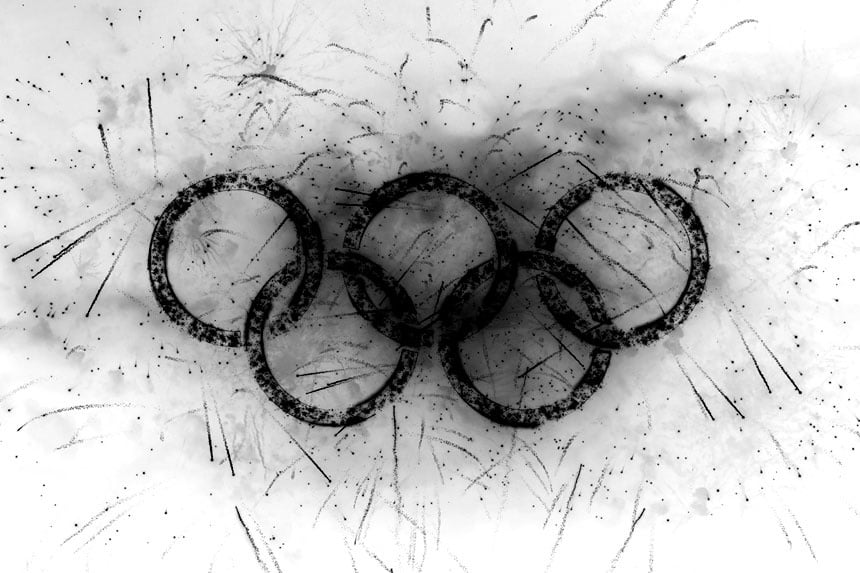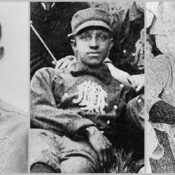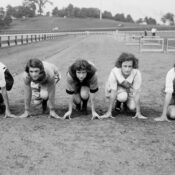The Olympic motto is “Citius, Altius, Fortius,” Latin for “Faster, Higher, Stronger,” to which some seem to have added the phrase “by any means necessary.” Almost from the first modern Games in 1896, Olympic competition has been marred by lying, cheating, and graft. As these top six Olympic scandals show, there’s plenty of disgrace to go around.
6. Jim Thorpe at the 1912 Stockholm Games
This scandal seems tame by today’s standards, but at the time, it was big news. At the 1912 Summer Games in Stockholm — back when the Olympics were intended to celebrate the accomplishments of amateur athletes — 25-year-old Jim Thorpe became the first Native American to win Olympic gold for his home country, in the pentathlon and decathlon.
However, the next year, the International Olympic Committee (IOC) stripped him of his medals after learning that he had played two seasons of “professional baseball” in Rocky Mount, North Carolina. In this case, “professional baseball” meant playing summer games for as little as $2 per game, something many college ballplayers were known to do, though they, unlike Thorpe, used aliases.
The IOC restored his Olympic medals in 1983, 30 years after his death.
5. An Épée at the 1976 Montréal Games
This scandal is amazing simply in its lack of subtlety. At the 1976 Summer Games in Montréal, Soviet pentathlete Boris Onishchenko was found to have rigged a button on the pommel of his épée. During the fencing portion of the pentathlon, pushing the button caused the electronic system to register a touch, whether he had earned one or not.
After the cheat was discovered, the entire Soviet pentathlon team was disqualified.
4. Marion Jones and the 2000 Sydney Games
In the run-up to the 2000 Summer Games in Sydney, Australia, track and field athlete Marion Jones had become a role model for young women, and especially women of color, throughout the U.S. The former WNBA player had landed endorsements from Nike and American Express, and when she arrived at the Games, she delivered, winning three gold medals and two bronzes.
Sadly, many members of the U.S. Olympic track and field team were mired in suspicions, then accusations, and then proof of steroid use. Throughout it all, Jones denied that she had used any performance-enhancing drugs.
In 2007, after a prolonged federal investigation, Jones admitted that she had, in fact, used steroids to prepare for the Games. Not only was she stripped of her five Olympic medals, but she also served six months in prison and two years’ probation for lying to federal prosecutors.
3. Basketball at the 1972 Munich Games
The 1972 Munich Summer Games will forever be remembered for the kidnapping and eventual murder of 11 Israeli athletes, coaches, and judges by members of the Palestinian group Black September. But the Games were also marred by some questionable decisions on the basketball court.
The gold-medal men’s basketball game between the U.S. and the USSR had run down to the final 3 seconds, with the U.S. team leading 50–49. The Soviet team began an inbound play that was blocked up by the American defense, but the referee recognized the Soviet bench calling a timeout; play was stopped with 1 second left on the clock. The Soviet bench claimed they had been trying to call a timeout since before the play had begun.
With 1 showing on the game clock, the Soviets inbounded again, and again the American team’s defense held firm. Time ran out, and fans rushed the court in celebration of a U.S. gold medal.
However, the Soviet team argued that the clock should have been reset to 3 seconds before that second inbound play had happened. After taking several minutes to clear the court of revelers, the teams were forced to replay the final 3 seconds of the game.
As they say, the third time’s a charm. This time, the long inbound throw found a Soviet forward who got the shot up and through in time, and the Soviet Union was awarded the gold medal.
The U.S. team filed a grievance early the next morning, but it was voted down by a jury, 3–2. All three of those votes, it has been noted, came from men from communist-bloc countries.
The U.S. team voted unanimously not to accept the silver medal and did not appear at the medal ceremony. To this day, they still have not accepted that second-place medal.
2. Tonya Harding, Nancy Kerrigan, and the 1994 Lillehammer Games
Not all Olympic scandals are about one country’s team defeating another.
On January 6, 1994, 24-year-old figure skater Nancy Kerrigan was practicing in Detroit the day before the U.S. Figure Skating Championships. A solid performance at the next day’s competition would seal her position on the U.S. Olympic team at the Lillehammer Games in Norway, just a few weeks away.
But as she stepped off the ice that Thursday morning, a masked man stepped from the shadows, struck her right kneecap with a police baton, and ran. Luckily, the assault resulted only in a bruised knee and a limp. Though Kerrigan could not compete in that year’s U.S. Figure Skating Championship, she was granted a spot on the U.S. Olympic team.
The police investigation unfolded quickly, and it soon became apparent that the attack had been masterminded — if you can call it that — by Jeff Gillooly, ex-husband of Tonya Harding, the 1991 U.S. figure skating champion and one of Kerrigan’s staunchest rivals. She, too, had won a spot on the U.S. Olympic figure skating team.
Two weeks before the Games began, Gillooly accepted a plea deal in exchange for testimony against Harding. He and his accomplices ended up doing jail time for the whole thing.
The USOC attempted to remove Harding from competition, but when she threatened a lawsuit, they allowed her to compete. The scandal was big news at the time, and the Lillehammer figure skating finals turned out to be one of the most-watched events in Olympic history. Kerrigan won the silver, while Harding — after being allowed to restart after convincing the judges that her shoestring had broken — took eighth place.
After the Olympics were over, Harding pleaded guilty to conspiring to hinder prosecution for failing to report important information that she claimed she had learned after the attack. She was given three years’ probation and fined $100,000. Additionally, she was barred from competition for life by the U.S. Figure Skating Association.
1. Practically Everything About the 1936 Summer Games in Berlin
Berlin had been awarded the 1936 Summer Games in 1931. When Hitler rose to power two years later, there were talks of boycotting and of moving the Games elsewhere. And in fact, many Jewish athletes from around the world refused to attend the Games in protest of Germany’s anti-Semitic stance.
Before the Olympics, the official viewpoint of the Nazi Party was that Blacks, Jews, and Romani should not be permitted to participate in the Games. Dr. Theodor Lewald, president of the German Olympic Committee, was even removed from his position when it was discovered that his paternal grandmother was Jewish.
Pressure both internationally and from inside the party led to a lightening of this stance. After all, it was argued, the Olympic Games could be Hitler’s chance to prove to the world the superiority of his German Aryan race. Foreign Blacks and Jews would henceforth be allowed to compete.
After a serious push in the U.S. for a boycott, U.S. Olympic Committee president Avery Brundage was invited to Germany so that authorities there could “prove” that a German Olympics would adhere to the spirit of the Games. “I was given positive assurance in writing,” he reported, “that there would will be no discrimination against Jews.” Even though Germany attempted to hide its racism — even pulling “No Jews Allowed” signs from hotel windows — racial and political bias tarnished much of the 1936 Games:
- Jewish athlete Gretel Bergmann had won the South German Championships for high jump in 1931 and ’32. After the rise of Nazism, her family sent her to the U.K. The government threatened reprisal against her parents if she did not return to compete for Germany, and so she did. She trained for two years and, a month before the Games began, even tied the German high jump record. Nonetheless, two weeks before the opening ceremonies, she was removed from the team for “underperformance.”
- German athlete Lilli Henoch had set world records in the discus (twice), shot put, and 4 x 1000 relay race and had won 10 national championships among four disciplines, but she had been barred from the German Olympic team as an undesirable. (She would ultimately be murdered in a Nazi death camp.)
- Much has been written of the fact that Hitler refused to shake hands with four-time track and field gold medalist Jesse Owens, whom German broadcasters and journalists always referred to as “the Negro Owens.”
- In a cycling match sprint final, German Toni Merkens fouled Dutchman Arie van Vliet. Instead of being disqualified, Merkens was fined 100 Reichsmarks and kept the gold medal.
- In a quarterfinal football match, Peru beat Austria 4–2 in overtime. (Peru actually scored five goals in overtime, but three were nullified by the referee.) Austria demanded a rematch on the grounds that Peruvian fans had stormed the field, that the field did not meet requirements, and that the Peruvian players had manhandled the Austrian players. When the Peruvian delegation attempted to go to the meeting to mount a defense, they were delayed by a German parade. With no apparent opposition, the rematch was scheduled. The entire Olympic delegations of both Peru and Colombia left Germany, and Austria was awarded the win by default.
Embedded in the Olympic Charter are the ideals of the preservation of human dignity, of “social responsibility and respect for universal fundamental ethical principles,” and of “a way of life based on the joy of effort.” As the focus seems to shift more and more toward the importance of winning over the joys of competition, one wonders how far we can stray from the Olympic ideal before it no longer holds any meaning.
This is not a new question. As far back in 1964, Post contributor Roger Kahn was arguing that the U.S. should pull out of the Olympic Games for good because they had long since become merely a political tool, ironically mimicking the ancient Olympic Games.
We hold out hope that this is not the fate of the Olympics, but maintaining the spirit of the Games isn’t a simple task. Perhaps it’s time to revisit the Olympic motto. Instead of “Faster, Higher, Stronger,” how about “Honor, Dignity, Fair Play”?
Become a Saturday Evening Post member and enjoy unlimited access. Subscribe now




Comments
My wife and I just viewed “Jim Thorpe, All American” where Burt Lancaster portrayed Jim Thorpe. I believe what the committee did to that young man was wrong and sadly had a negative effect on him for the remainder of his life. In my opinion, much of this was done due to the fact he was an American Indian and was perhaps an early form of racism and discrimination. It was great they saw their error in later years but it was too bad that could not have occurred sooner long before his passing.
I agree with Louis and Mark. All of these scandals are fascinating and diverse in nature. Hopefully the athletes are drug and gender tested (also) as needed, so the wins are fair.
Andy, you put together an excellent article on Olympic scandals. Really enjoyed the behind the scenes details involved in the aforementioned scandals. Thoroughly entertaining.
Strongly recommend ALL athletes be drug tested immediately after their 1st performance.